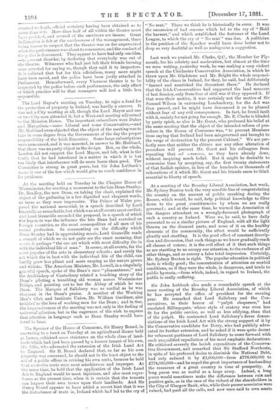At the meeting held. on Tuesday in the Chapter House
at Westminster, for erecting a monument to the late Dean Stanley, Dr. Bradley, the new Dean, on taking the chair, explained the object of the gathering in a few dignified and eloquent words, as terse as they were impressive. The Prince of Wales pro- posed the national memorial, in a speech described by Lord Granville as remarkable, but which was at all events most cordial; and Lord Granville seconded the proposal, in a speech of which the key-note was the influence the late Dean had exercised on foreign countries, as the most cosmopolitan of all men of his sacred profession. In commenting on the difficulty which Dean Stanley bad in appreciating music, Lord Granville made a remark of which we do not quite see the exact meaning, that music is perhaps "the one art which with most difficulty fits in with the individual life of man." It seems, at all events, far the most popular of the arts in elementary schools; and surely the art which fits in best with the individual life of the child, can hardly grow less pliant and more rasping as the nature grows and widens. The American Minister, Mr. Lowell, in a singularly graceful speech, spoke of the Dean's rare "pleasantness;" and the Archbishop of Canterbury related a touching story of the Dean's piloting a trembling old woman across Westminster Bridge, and pointing out to her the Abbey of which be was Dean. The Marquis of Salisbury was as cordial as he was eloquent in the Dean's praise. A member of the Working Men's Club and Institute Union, Mr. William Gardiner, also testified to the love of working men for the Dean ; and in fine, the impressiveness of the meeting was not only in the feeling of universal affection, but in the eagerness of the wish to express that affection in language such as Dean Stanley would have loved to hear.










































 Previous page
Previous page